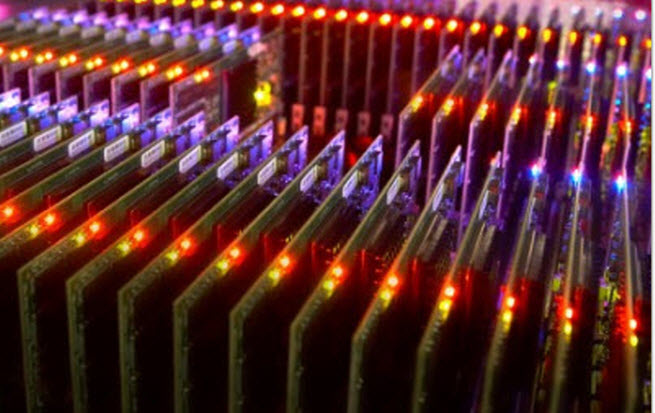
Violin Memory has raised $50 million in a fourth round of funding at a market value of more than $800 million, the company said today.
Mountain View, Calif.-based Violin Memory makes flash memory arrays like the one pictured above. Those are used as primary storage for servers in enterprise data centers. The arrays replace slower disk drives.
[aditude-amp id="flyingcarpet" targeting='{"env":"staging","page_type":"article","post_id":410178,"post_type":"story","post_chan":"none","tags":null,"ai":false,"category":"none","all_categories":"enterprise,entrepreneur,","session":"D"}']Investors include long-time partners Toshiba and Juniper Networks, and new investors SAP Ventures and Highland Capital. Other participants in the funding don’t allow their names to be used.
“At the intersection of big data, virtualization, and business critical applications, Violin’s flash-based primary storage puts us in a unique position to capitalize on they hyper-growth of flash in the enterprise data center,” said Don Basile, chief executive of Violin Memory, in a statement “This is a multibillion-dollar market opportunity and the latest funding enables us to accelerate our aggressive go-to market strategy and enhance our data management software portfolio to bring the benefits of Violin’s technology to customers worldwide.”
AI Weekly
The must-read newsletter for AI and Big Data industry written by Khari Johnson, Kyle Wiggers, and Seth Colaner.
Included with VentureBeat Insider and VentureBeat VIP memberships.
The main storage for data in servers has traditionally been the hard-disk drive. Flash memory devices — which are solid-state semiconductor chips — have been much faster than the spinning magnetic disks. But the reliability and the storage density used to be too low for flash memory. Improvements on that front have enabled flash to be used as primary data storage. Violin says it can improve the performance of Oracle databases by ten times. The addressable market of hard drive arrays is $20 billion, as measured by Gartner. That market is vulnerable to replacement by smaller servers with incredible amounts of input-output performance, Basile said in an interview with VentureBeat.
Customers include AOL, Revlon, Tagged.com, Juniper and Hewlett-Packard. Violin has now raised $152 million since a recapitalization in 2009. The company was founded in 2005 and launched its first memory arrays in 2009 and has since deployed multiple product generations using RAID protection for reliability. In June 2010, Violin acquired Gear6.
Fusion-io does server caching, but direct rivals include makers of arrays of hard disks. Those direct rivals include EMC, Network Appliance, IBM, Hitachi and Dell. There are perhaps dozens of startups trying to do flash arrays, Basile said. The company has grown from 100 employees a year ago to more than 320 now.
“We see 2012 as a key adoption year,” he said. “We tripled our employment in the past year. We continue to grow sales and fairly aggressively on the engineering side.”
The new round is a mezzanine round that will enable the company to continue its rapid growth, Basile said.
VentureBeat's mission is to be a digital town square for technical decision-makers to gain knowledge about transformative enterprise technology and transact. Learn More
